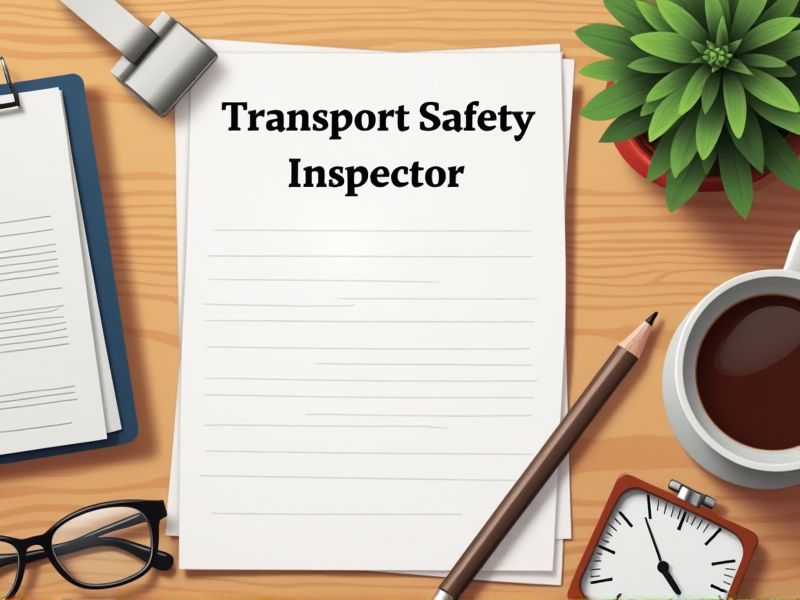
Transport Safety Inspectors play a critical role in ensuring the safe and efficient operation of transportation systems, reducing risks for both operators and the public. Certifications are essential as they validate an inspector's expertise in regulatory compliance and improve their ability to identify and mitigate potential hazards. The complex and evolving nature of transportation technologies demands ongoing education, which these certifications help sustain. Important certifications for a Transport Safety Inspector include those focused on specific regulatory guidelines and technological competencies.
Certified Safety Professional (CSP)
Obtaining a Certified Safety Professional (CSP) designation often leads to an enhanced understanding of complex safety protocols, essential for Transport Safety Inspectors who continually assess and mitigate inherent transport risks. The CSP certification indicates advanced expertise in safety management, directly influencing a Transport Safety Inspector's capability to develop and implement effective safety measures. Employers frequently prefer CSP-certified professionals, which can impact hiring decisions due to the certification's association with high-level competency in risk reduction. Holding a CSP credential typically corresponds to an improved ability to audit safety standards, ensuring compliance and promoting a culture of safety in transportation environments.
OSHA 30-Hour General Industry Certification
Transport Safety Inspectors require the OSHA 30-Hour General Industry Certification due to its comprehensive training on workplace safety and health regulations, which enhances their ability to identify potential hazards on the job. Understanding OSHA standards ensures inspectors can effectively enforce compliance, thereby reducing workplace accidents and improving overall safety within the transport sector. Certification also signifies a commitment to professional development, which often correlates with increased trust from employers and regulatory bodies. Mastery of these regulations is critical for inspectors responsible for conducting routine safety audits and inspections in industrial environments.
Hazardous Materials (HAZMAT) Transportation Certification
The certification ensures that transport safety inspectors understand and apply the regulatory requirements for handling and transporting hazardous materials. This understanding minimizes the risk of accidents and environmental damage during transportation. Inspectors are better equipped to identify and address safety violations, enhancing overall transport safety. Proper certification promotes compliance and safety in the logistics sector by ensuring all safety standards are met.
Vehicle Inspection and Safety Certification
Vehicle Inspection and Safety Certification helps ensure that vehicles meet safety regulations, reducing the risk of accidents on the road. A thorough inspection allows a Transport Safety Inspector to identify and address potential hazards, which might otherwise compromise the safety of passengers and drivers. By certifying vehicles, inspectors create accountability and encourage vehicle owners to maintain proper safety standards. Consistent inspection and certification contribute to a safer transportation network, decreasing the likelihood of mechanical failures.
Defensive Driving Certification
Transport safety inspectors play a critical role in overseeing the safe operation of vehicles, and possessing a Defensive Driving Certification enhances their ability to identify potential hazards and mitigate risks. Certification demonstrates a thorough understanding of safe driving techniques, making inspectors better equipped to evaluate the driving practices of transport operators. Knowledge of defensive driving strategies is essential for predicting and managing complex on-road scenarios, which directly contributes to reducing accidents. Holding such a certification often serves as a benchmark for standardized safety protocols, aligning with industry requirements and ensuring consistent assessments across the board.
Accident Investigation Certification
Obtaining an Accident Investigation Certification equips a Transport Safety Inspector with specialized knowledge to effectively analyze incidents and identify causes. This certification ensures the inspector can apply structured methodologies, improving accuracy in investigations. Thorough accident investigations help mitigate future risks by informing policy changes and safety regulations. Experience and certified training validate the inspector's expertise, enhancing public and organizational trust in their assessments and recommendations.
Transportation Risk Management Certification
Transport Safety Inspectors often work in high-risk environments with significant potential for accidents, underscoring the need for Transportation Risk Management Certification. This certification provides inspectors with specialized knowledge in identifying and mitigating risks, leading to reduced incidents and improved safety outcomes. It equips them with the tools to assess transport systems effectively, ensuring compliance with safety regulations. Organizations gain from having certified inspectors as they can enhance their safety protocols and reduce liability.
Safety Management Systems (SMS) Certification
Achieving SMS Certification equips Transport Safety Inspectors with the necessary uniform procedures to evaluate and enhance safety across various transportation modes. SMS Certification ensures inspectors can identify potential hazards and implement measures to mitigate risks effectively. With this certification, inspectors contribute to lowering accident rates by adhering to a standardized safety protocol. Certification enhances inspectors' credibility and trust, fostering public confidence in transportation systems.
Security Awareness Certification
Security awareness certification enhances the ability of transport safety inspectors to identify and mitigate potential threats. With this certification, inspectors gain up-to-date knowledge on security protocols, reducing the risk of breaches. It also ensures compliance with industry regulations, minimizing legal liabilities. Ongoing training through certification leads to more effective vigilance and safer transportation environments.
Emergency Response Preparedness Certification
Emergency Response Preparedness Certification equips transport safety inspectors with essential skills to effectively manage and mitigate accidents or hazardous situations. Proper certification underscores the ability to communicate critical information during emergencies, reducing response times and increasing the safety of passengers and personnel. Possessing this certification demonstrates a commitment to upholding industry safety standards, which builds public trust and confidence in the transportation system. As transportation networks grow complex, certified inspectors are better prepared to handle the evolving risk landscape inherent in these systems.
Summary
By obtaining certifications, you enhance your expertise and credibility as a Transport Safety Inspector. This leads to improved decision-making and increased confidence in enforcing safety regulations. Inspections become more efficient, reducing potential risks and non-compliance issues. As a result, the transportation sector experiences heightened safety standards and operational reliability.
